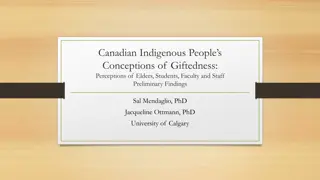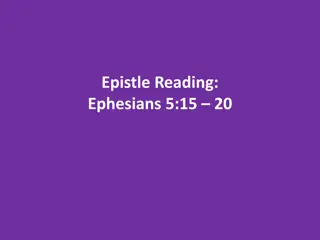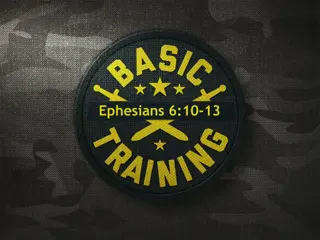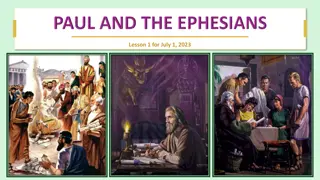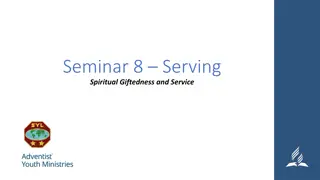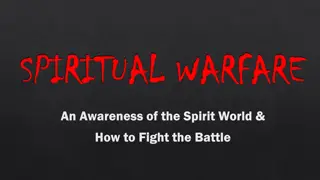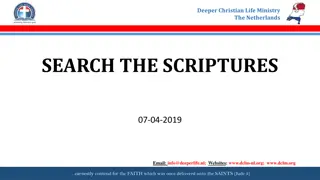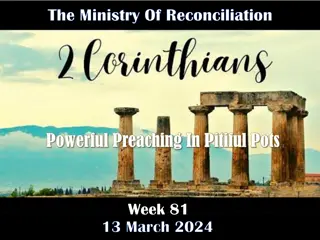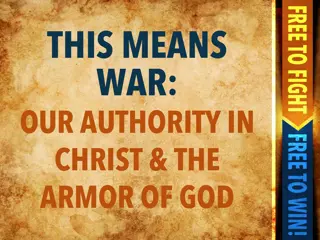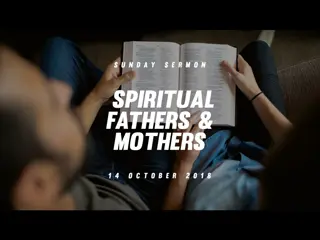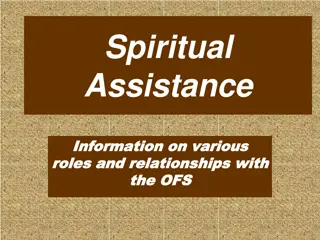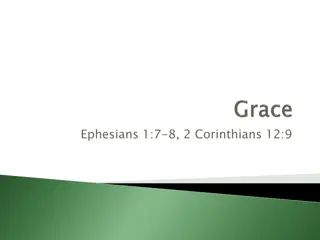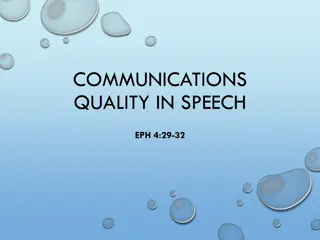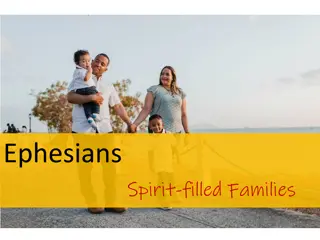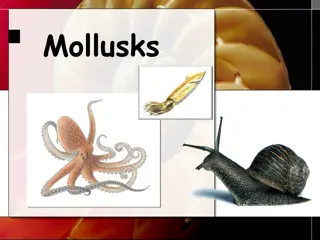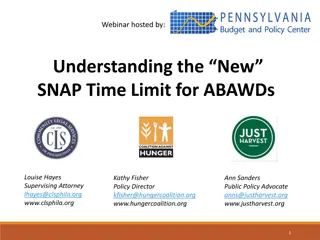Embracing a Full-Bodied Ministry in Ephesians: A Discussion on Spiritual Giftedness
Paul emphasizes the importance of spiritual gifts in Ephesians 4:7-8, highlighting the diversity in the church and the purpose of these gifts in building up the body of Christ. By embracing these gifts, believers can strive for unity in faith, knowledge, and love, working together in their unique capacities towards common goals.
Download Presentation

Please find below an Image/Link to download the presentation.
The content on the website is provided AS IS for your information and personal use only. It may not be sold, licensed, or shared on other websites without obtaining consent from the author. Download presentation by click this link. If you encounter any issues during the download, it is possible that the publisher has removed the file from their server.
E N D
Presentation Transcript
Embracing A Full Embracing A Full- -Bodied Ministry 4:7 4:7 16 Bodied Ministry 16 Week 22 Week 22 29 June 2022 29 June 2022
EPHESIANS CH4 OVERVIEW Perhaps as motivation, Paul reminded the Ephesians of the gracious gifts Christ gave His church following His ascension to heaven. Such gifts included the offices of apostles, prophets, evangelists, pastor-teachers designed to equip the saints for ministry and to bring the body of Christ to maturity. In this way, the Ephesians would not be misled by false doctrine, but instead by speakingthetruth in love they would grow in Christ as each member does his or her share for the edifying of the body in love (7 16).
EPHESIANS 4:7 16 The topic of spiritual giftedness is clearly important for an understanding of the Christian life. Paul directly addresses this issue in a number of places, most specifically in Romans 12, 1Corinthians 12-14, and here in Ephesians 4. In each of these passage, Paul not only describes various gifts given to individual believers but also explains the purpose of the gifts to build up the body of Christ. In Ephesians 4:7-16, we ll see that Paul expected a great deal of diversity in the church as different people exercised their gifts. At the same time, Paul points us to God s ultimate reason for giving spiritual gifts to His people so that we might attain to the unity of the faith, and of the knowledge of the Sons of God (4:13).
EPHESIANS 4:7 8 7But to each one of us grace has been given as Christ apportioned it. 8This is why it says: When he ascended on high, he took many captives and gave gifts to his people.
EPHESIANS 4:7 8 Paul begins 4:7 with a mild contrast But to each one of us. What is Paul contrasting in 4:4-6, where he set out this oneness litany one body, one Spirit, one hope, one Lord, one faith, one baptism, one God and Father of all. Showing unity as only part of the picture. Here, Paul also insists that unity is not the same as uniformity. Harmony is not monotony. Instead , the perfect picture of the church is diversity in unity each person working in his or her unique capacity toward a common goal. When Paul says, to each one of us, we can personalize that. He means you! To you, grace has been given according to the measure of Christ s gift (4:7).
EPHESIANS 4:7 8 That is, you have been called by God, saved by the death and resurrection of Christ, and sealed by the Holy Spirit. The immeasurable grace of God has been extended to you personally. Too many Christians, however, settle for the grace of salvation saving grace and never realize that God has also given them the grace of sanctification enabling grace. Though we have been given Christ s gift, which places us in the body of Christ (4:7), many Christians fail to receive Christ s gifts, which equip us to minister in and to the body of Christ (4:8).
EPHESIANS 4:7 8 In 4:8 Paul paraphrases Psalm 68:18, applying an important OT image to his NT context. In that psalm, David called for God to rescue His people and vindicate them as He had in the past. The Lord had led His people in triumph during the Exodus (Ps. 68:7). Mt. Sinai quaked (Ps. 68:8), and the kings of the earth were scattered (Ps. 68:11-14). Then He set Himself upon His holy mountain (Ps. 68:15-17) and received gifts from men (Ps. 68:18). Paul applies this picture to Christ s ascension because he saw it as a potent representation of God triumph.
EPHESIANS 4:7 8 After His crucifixion and resurrection, Christ led His people to freedom and ascended in victory. He led captive a host of captives (Eph 4:8), seating believers with Him spiritually in the heavens (2:6). Though we were once enemies of God (2:12), we have been brought into His family through the reconciliation of Christ (2:19). Once bound by sin and subject to the kingdom of Satan, we have been taken captive by Christ and are joint heirs in the kingdom of heaven. While Psalm 68 spoke simply of God receiving the spoils of war from His enemies, Paul indicates that Christ s conquest of sin, death, and the devil resulted in the distribution of the wealth He received through His victory. Upon whom did Christ shower these gifts? Paul answers in 4:11 after a brief parenthesis.
EPHESIANS 4:9 10 9(What does he ascended mean except that he also descended to the lower, earthly regions? 10He who descended is the very one who ascended higher than all the heavens, in order to fill the whole universe.).
EPHESIANS 4:9 10 The mention of Christ s ascension leads Paul into a short parenthetical thought, in which he gives his readers a brief insight into some facts surrounding that victorious event. Paul states that the phrase He ascended emphasizes the fact that Christ must have also descended (4:9-10). But from where did He descend and how far down did He go? This question has irked Bible scholars for centuries. Three major interpretations are common . . .
EPHESIANS 4:9 10 FIRST perhaps the descent refers to the Incarnation, in which the divine Son of God descended from heaven to take on a human nature. Paul s words here would then be parallel to his similar thought in Philippians 2:6-8. In this case, the phrase into the lower parts of the earth could be translated into the lower parts, namely, the earth. As a subset of this view, some say Paul could have had in mind the lowest part of the earth, namely, the tomb in which Christ was buried. In any case, the earthly, physical sphere would be what Paul had in view.
EPHESIANS 4:9 10 SECOND perhaps the descent refers to events following Christ s ascension, when the Holy Spirit descended upon the church at Pentecost and bestowed gifts on the body of Christ (Acts 2). This would be similar to Christ s promise to send the Holy Spirit after He had ascended to the Father, coming to them in the spiritual sense through the Spirit s presence in the church (John 14:16-18).
EPHESIANS 4:9 10 THIRD perhaps the descent refers to the time between Christ s death and resurrection. Many Christians believe that after His death on the cross, Christ descended into the place of departed spirits, proclaiming victory over wicked spirits in bondage and leading Old Testament saints on a victorious ascent to paradise (cf., 1Peter 3:18-20). I, along with SWINDOLL, leans toward this third interpretation. The view of Christ s descent to the spiritual realm known as Sheol or Hades between His death and resurrection is extremely ancient and enduring in the history of the church. In fact, the Apostle s Creed, recited by countless churches worldwide, states that Christ was crucified, dead, and buried; He descended into Hades.
EPHESIANS 4:9 10 Nevertheless, whatever disagreements scholars may have over 4:9, they all agree on the essential meaning of 4:10. Christ ascended to the Father so that He might fill all things. This last phrase tells us that Christ did not ascend simply to leave the world behind Him. Rather, He ascended so that He might expand His presence and influence in the world. How? In John 16:7, Jesus said, I tell you the truth, it is to your advantage that I go away; for if I do not go away, the Helper will not come to you; but if I go, I will send Him to you. Earlier Jesus had said that through the presence of the Holy Spirit in the church, He Himself would come to dwell among His people (John 14:16-18).
EPHESIANS 4:9 10 In Colossians, Paul calls this the mystery . . . which is Christ in you (Col 1:27). Though Jesus has ascended to heaven bodily and is seated at the right hand of the Father, He can be truly present with us through the work of the Holy Spirit, whose presence bridges the distance between heaven and earth. This made it possible for Christ to promise His disciples that in the day when the Holy Spirit comes, you will know that I am in My Father, and you in Me, and I in you (John 14:20). When Christ sent the gift of the Holy Spirit from heaven, the Holy Spirit brought with Him numerous gifts, which He distributes to every member of the body of Christ just as He wills (1Cor 12:11).
EPHESIANS 4:9 10 Paul reasons like this: Christ s descent and ascension won Him the spoils of victory and the blessing of the Holy Spirit. From His exalted position, He has led many in His victory train. In turn, He has bestowed the gift of the Holy Spirit upon the church. The Holy Spirit manifests His power in the church through a multitude of spiritual gifts that differ in kind.
EPHESIANS 4:11 11So Christ himself gave the apostles, the prophets, the evangelists, the pastors and teachers.
EPHESIANS 4:11 Five passages in the NT list approximately twenty spiritual gifts God has given the church: Romans 12:6-8; 1Corinthian 12:8-10, 28-30; Ephesians 4:11; and 1Peter 4:10-11. SWINDOLL defines spiritual gifts as a God-given ability or skill that enables a believer to perform a specific function in the body of Christ with effectiveness and ease. NOTE:Spiritual gifts are given by the Lord, not by other Christians. Teaching, training, and experience can strengthen and sharpen your spiritual gifts, but they can t bestow them. They are spiritual gifts, not because they re mystical, impractical, or subjective things, but because their power comes from the Holy Spirit, and they bring about real spiritual change.
EPHESIANS 4:11 Here are a few other vital facts about spiritual gifts: Every believer has at least one spiritual gift; some have more than one (cf., 1Cor 12:7; 14:1). Spiritual gifts are given with our salvation and are used to fulfill God s calling for us (1Cor 14:26; Eph 4:12; 1Pet 4:11). The gifts are varied and fill different roles. Some are more visible than others, but all are equally important (1Cor12:12-25). All the gifts derive their power from the same source the triune God (1Cor 12:4-6).
EPHESIANS 4:11 Here are a few other vital facts about spiritual gifts: Spiritual gifts are given not for one s own edification but for the common good (1Cor 12:7). All the gifts are meant to give glory to the one who so lavishly bestows them (1Pet 4:11). The best and only foolproof way to learn and sharpen your spiritual gifts is throughministry experience. That is, roll up your sleeves and get to work in a ministry. Find an opportunity and volunteer. See a need and step in . . . give it a try. You will quickly discover the areas in which the Holy Spirit has uniquely gifted you for ministry.
EPHESIANS 4:11 In Ephesians, Paul focuses on four types of gifted people given to the church: apostles, prophets, evangelists, and pastor-teachers. APOSTLES: Apostleship in a general sense refers to people who are sent in an official capacity. In the NT it often has a more technical meaning. Apostles had seen the risen Lord (1Cor 9:1; 15:7-9). They had been endowed by God with the ability to do amazing signs and wonders to confirm their gospel message. Their labor produced fruit among unreached peoples, establishing churches far and wide. Moreover, they were gifted with unparalleled wisdom, which rendered their message absolutely authoritative. Because of the uniqueness of this ministry, there are no official apostles today.
EPHESIANS 4:11 PROPHETS: Like the gift of apostleship, the gift of prophecy was also regarded in Scripture as a foundational ministry of the church and therefore historically temporary (Eph 2:20). Prophets were the unique mouth-piece of God. Like OT prophets, the prophets of the early church foretold the future (Acts 11:28) and exhorted, encouraged, and strengthened God s people (Acts 15:32). They revealed the Word of God when the NT Scriptures had not yet been completed and collected. After the completion of the NT, the gifts of both apostles and prophets wound down. Today, the gift to carry the message to unbelievers is carried out by evangelists and pastor-teachers.
EPHESIANS 4:11 EVANGELISTS: As traveling ministers similar to itinerant preachers or missionaries today, evangelists brought the gospel to non-Christian regions (Acts 8:5-13). They often started churches or further developed those established by apostles. A gifted evangelist possesses a special ability to communicate the gospel, to make it particularly plain and relevant to unbelievers, and to help hesitant people take the step of faith. The result of their efforts are often numerically impressive. NOTE: we all must share in carrying out the great commission (Matt 28:18-20). We should never be tempted to leave evangelism to the experts. Christ wants all of us to spread His message among our friends (2Tim 4:5).
EPHESIANS 4:11 PASTOR-TEACHERS:The two terms pastor and teachers are linked grammatically in the Greek text. Paul uses one article for the two terms. Though they can be distinguished, Paul likely had in mind a close association between pastors and teachers. It s quite likely that pastors and teachers referred to roles of the elders in the churches, whose responsibility it was to shepherd and to teach (1Tim 3:2; 1Pet5:1-3). The pastor shepherded the flock by meeting the day-to- day needs of the congregation counseling, confronting, comforting, and guiding. As well as taught the flock through the teaching and preaching of the Word of God.
EPHESIANS 4:11 PASTOR-TEACHERS [cont.]: This gift has not changed over time. Leaders functioning as pastors and teachers do the same work in the churches today that their predecessors did centuries ago. NOTE: These brief descriptions of apostles, prophets, evangelists, and pastor-teachers exemplify the care God has for His church. He didn t leave the church orphaned, with nobody to teach, comfort, shepherd, or nurture them in their fledgling faith. Instead, He sent His Spirit, whose grace so transformed the lives of believers that they would be used by God to build up the body of Christ both the local churches and the universal church throughout the world.
EPHESIANS 4:12 16 12There to equip his people for works of service, so that the body of Christ may be built up 13until we all reach unity in the faith and in the knowledge of the Son of God and become mature, attaining to the whole measure of the fullness of Christ. 14Then we will no longer be infants, tossed back and forth by the waves, and blown here and there by every wind of teaching and by the cunning and craftiness of people in their deceitful scheming. 15Instead, speaking the truth in love, we will grow to become in every respect the mature body of him who is the head, that is, Christ. 16From him the whole body, joined and held together by every supporting ligament, grows and builds itself up in love, as each part does its work.
EPHESIANS 4:12 16 We must allow Ephesians 4 to remind us that the church is not a corporation. The church is a family. The church is a body. SWINDOLL quotes Ray Stedman > We easily forget the church is a body. We have tried to operate the church as an institution, a corporation, a business. But the reality Paul wants us to grasp in Ephesians is that the church is a body, made up of cells and the cells are individual believers, you and me and our other brothers and sisters in Christ. Each cell has a unique role to play in keeping the entire body healthy.
EPHESIANS 4:12 16 Following his rapid-fire list of leaders given to the church in 4:11, Paul answers the why and the how questions in 4:12-16. Why has the Lord gifted the body with these leadership gifts? And how do these relate to the spiritual gifts distributed throughout the entire body of Christ? Paul gives threereasonsfor God s gifts to the church (4:12) and emphasizes four results of a healthy, full-bodied ministry of the Spirit (4:13-16). In the process Paul reveals threepurposes for the gifted ministries of leadership in the church: an immediate purpose (4:12), an intermediate purpose (4:13-15), and an ultimate purpose (4:16).
EPHESIANS 4:12 16 The IMMEDIATE PURPOSEof God s gifts of leadership in a local church is to equip every believer in the congregation to work toward buildingup the body of Christ (4:12). These threesteps Paul lists equipping serving building up should not be thought of as independent of one another. In fact, the first (equipping saints) leads to the second (serving), which results in the third (building up the church). As a result of this equipping, members of the body learn to function in new ways, exercising their individual gifts for the benefit of the whole body under the direction and encouragement of church leaders.
EPHESIANS 4:12 16 The members of a congregation are equipped for the work of service (4:12). Unfortunately, many churches hire staff people to do all the real work. The congregation sits back, arms folded, and observe or supervise while the hired hands do the heavy lifting related to the ministry. SWINDOLL quotes Howard Hendricks > The church is too much like a football game fifty thousand people in the stands, desperately in need of exercise, watching twenty- two people on the field desperately in need of rest. The primary mission of the paid minister is to equip the rest of the church to engage in meeting the needs of the flock, by exercising their individual spiritual gifts for the benefit of all.
EPHESIANS 4:12 16 The INTERMEDIATE PURPOSE is promoting unity, mature knowledge, doctrinal stability, and authentic, loving speech (4:13-15). The firstsign of a grown-up congregation is that the believers possess the unity of the faith (4:13). These include major doctrinal issues like the Trinity, the full deity and full humanity of Christ, the Virgin Birth, the atoning death of Christ to pay for our sins, the miraculous bodily resurrection of Christ, the promise of His future return, salvation by grace alone through faith alone in Christ alone, the inspiration and inerrancy of Scripture, and similar orthodox, non-negotiable truths.
EPHESIANS 4:12 16 The secondsign of a grown-up congregation is that the believers possess a strong knowledge of the Son of God (4:13). The core doctrines of the Christian faith center upon the person and work of Jesus Christ in His first and second coming. Helping believers know Him both factually and relationally, both theologically and intimately, is a goal of the preaching and teaching ministries of the church. This true knowledge touches not only the head but also the heart, resulting in a life of devotion and dedication.
EPHESIANS 4:12 16 The third sign of a grown-up congregation is expressed through unity of the faith and knowledge of Christ that leads to mature doctrinal stability (4:14). Nothing is more tragic than adults who live clueless Christian lives like infants, especially those longtime believers who ought to be teachers but need somebody to teach them the elementary principles of the Christian faith (Heb 5:12). Paul frequently warned congregations against false teachers, and the Ephesian church was no exception. Yet false doctrine is not a thing of the past. In fact, throughout the centuries Satan and his followers have continued to fabricate deceitful philosophies, false religions, and twisted versions of Christianity.
EPHESIANS 4:12 16 The fourth sign of a grown-up congregation is a mature built-up body that is speaking the truth in love (4:15). The balance between truth and love is often difficult to maintain. Some of us are good at truth. We can spot the smallest inaccuracy in a person s theological expression and have no fear of pointing it out. Others of us desiring to keep the peace, let false teaching go uncontested or allow lies to go uncorrected. We just can t bring ourselves to rock anyone s boat for fear that we ll cause too many waves in the church. But God wants us to be neither abrasive nor timid. He wants us to show both strength and love. Truth becomes hard if not soften by love; love becomes soft if it is not strengthened by truth.
EPHESIANS 4:12 16 The ULTIMATE PURPOSE is the growth of the whole body through the loving cooperation of all of its members fitly joined together (4:16). A human body is healthy when all of its parts are operating properly and working in harmony. Similarly, a church body is healthy when all of its members submit to the headship of Christ, walk in the Spirit, contribute to the community with their gifts and talents, and live in cooperation with each other. The body grows as the individual members grow, and the members grow as they feed on the Word and minister to one another.
EPHESIANS 4:12 16 The church doesn t become mature overnight. It takes time and patience and love. As God works through each individual s exercise of spiritual gifts for the sake of others, He builds us up as a healthy, productive, wholesome body. We need to trust the growth process as we individually contribute to the project. Only then will we learn to embrace a full-bodied ministry as God designed it.
NEXT CLASS 6 July 2022 Before next class, read the below verses in the Before next class, read the below verses in the NIV and in one other versions of the Bible, i.e., NIV and in one other versions of the Bible, i.e., NKJV, NRSV, KJV, CEV, etc NKJV, NRSV, KJV, CEV, etc Chapter 4:17 32 Off With The Old, and On With The New


